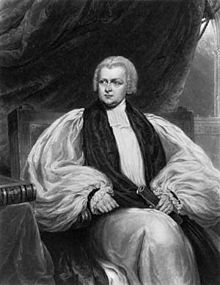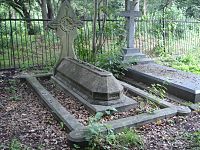- Charles Blomfield
-
Charles Blomfield Bishop of London 
Church Church of England Diocese Diocese of London Elected 1828 Reign ended 1856 (ill health) Predecessor William Howley Successor Archibald Tait Other posts Bishop of Chester
1824–1828Orders Ordination 1810 Consecration c. 1824 Personal details Born 29 May 1786
Bury St Edmunds, SuffolkDied 5 August 1857 (aged 71) Buried All Saints Church, Fulham Nationality British Denomination Anglican Residence Fulham Palace, London Spouse Dorothy Cox (m. 1819) Children 4 daughters & 6 sons including:
Sir Arthur Blomfield and
Rt Revd Alfred BlomfieldAlma mater Trinity College, Cambridge Charles James Blomfield (29 May 1786 – 5 August 1857) was a British divine, and a Church of England bishop for 32 years.
Contents
Early life
Blomfield was born in Bury St Edmunds, Suffolk and educated at the local grammar school and at Trinity College, Cambridge, where he won the Browne medals for Latin and Greek odes, and the Craven scholarship.[1] In 1808, he graduated as third wrangler and first medallist, and in the following year was elected to a fellowship at Trinity College.
Career
The first-fruits of his scholarship was an edition of the Prometheus of Aeschylus in 1810; this was followed by editions of the Septem contra Thebas, Persae, Choephori, and Agamemnon, of Callimachus, and of the fragments of Sappho, Sophron and Alcaeus.
Blomfield, however, soon ceased to devote himself entirely to scholarship. He had been ordained in 1810, and held in quick succession the livings of Chesterford, Quarrington, Dunton, Great and Little Chesterford, and Tuddenham. In 1817 he was appointed private chaplain to William Howley, Bishop of London. In 1819 he was nominated to the rich living of St Botolph, Bishopsgate, and in 1822 he became archdeacon of Colchester. Two years later he was raised to the bishopric as bishop of Chester where he carried through many much-needed reforms.
In 1828, he was appointed a Privy Counsellor[1] and translated becoming bishop of London,a post which he held for twenty-eight years. During this period, his energy and zeal did much to extend the influence of the church. He was one of the best debaters in the House of Lords (members of the Upper House of the Canterbury Convocation confessed to trimming their quill pens before his arrival!), took a leading position in the action for church reform which culminated in the ecclesiastical commission, and did much for the extension of the colonial episcopate; and his genial and kindly nature made him an invaluable mediator in the controversies arising out of the tractarian movement.
Later life
His health at last gave way, and in 1856 he was permitted to resign his bishopric, retaining Fulham Palace as his residence, with a pension of £6000 per annum.
Blomfield is buried in the churchyard of All Saints Church, Fulham, London and a memorial to him, by G. Richmond, can be seen at Saint Paul's Cathedral along the south wall of the ambulatory.
Published works
His published works, exclusive of those above mentioned, consist of charges, sermons, lectures and pamphlets, and of a Manual of Private and Family Prayers. He was a frequent contributor to the quarterly reviews, chiefly on classical subjects.
See Memoirs of Charles James Blomfield, D. D., Bishop of London, with Selections from his Correspondence, edited by his son, Alfred Blomfield (1863); GE Biber, Bishop Blomfield and his Times (1857).
Personal life
He married Dorothy (née Cox, widow of Thomas Kent of Hildersham, Cambridgeshire) on 17 December 1819 at St George, Hanover Square, London and they had the following known children: Mary Frances (1821), Frederick George (1823), Isabella (1824), Henry John (1826), Francis (1826), Lucy Elizabeth (1830), Charles James (1831) and Dorothy Hester (1836).
He was also the father of the architect Sir Arthur Blomfield (born 1829) and of the Rt Revd Alfred Blomfield, Bishop of Colchester (born 1833).
Dorothy also had one son from her first marriage, Thomas Fassett Kent who was born in 1817 in Ellough, Suffolk.
See also
References
- ^ a b Blomfield, Charles James in Venn, J. & J. A., Alumni Cantabrigienses, Cambridge University Press, 10 vols, 1922–1958.
 This article incorporates text from a publication now in the public domain: Chisholm, Hugh, ed (1911). Encyclopædia Britannica (11th ed.). Cambridge University Press.
This article incorporates text from a publication now in the public domain: Chisholm, Hugh, ed (1911). Encyclopædia Britannica (11th ed.). Cambridge University Press.- Bishop Blomfield's papers are deposited at Lambeth Palace Library
Church of England titles Preceded by
George LawBishop of Chester
1824–1828Succeeded by
John SumnerPreceded by
William HowleyBishop of London
1828–1856Succeeded by
Archibald TaitCategories:- 1786 births
- 1857 deaths
- People from Bury St Edmunds
- Alumni of Trinity College, Cambridge
- Fellows of Trinity College, Cambridge
- Bishops of Chester
- Bishops of London
- Archdeacons of Colchester
- Members of the Privy Council of the United Kingdom
- Members of the Canterbury Association
Wikimedia Foundation. 2010.

